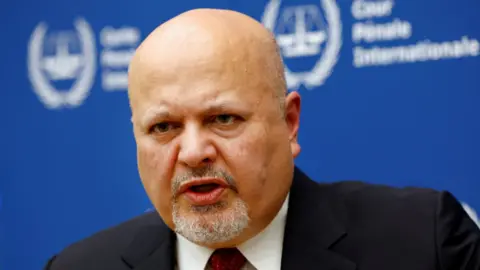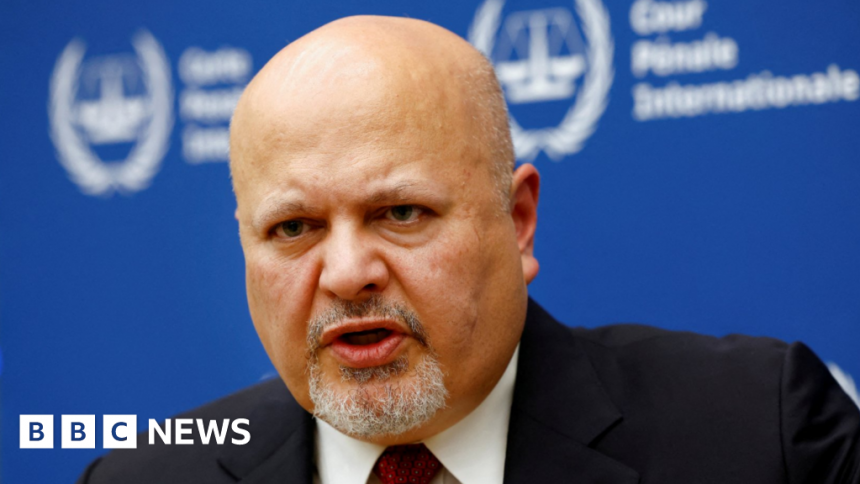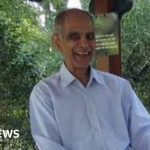ICC chief prosecutor defends Netanyahu arrest warrant in BBC interview
 Reuters
ReutersThe chief prosecutor of the International Criminal Court has told the BBC that justice must be seen to be done after seeking an arrest warrant for Israel’s prime minister and defence minister.
Karim Khan said it was important to show that the court would hold all nations to the same standard in relation to alleged war crimes. He also welcomed the new UK government’s decision to drop its opposition to the arrest warrants.
“There’s a difference of tone and I think of substance in relation to international law by the new government. And I think that’s welcome,” Mr Khan told the BBC’s Nick Robinson.
He has also requested warrants for three Hamas leaders, two of whom have since been killed.
In a wide-ranging interview, he explained the ICC needed to request warrants for leaders on both sides to ensure people around the world thought the court was applying “the law equally based upon some common standards”.
“If one had applied for warrants in relation to Israeli officials and not for Gaza, [some would] say: ‘well, this is an obscenity’ and, ‘how on earth is that possible?’” Mr Khan said.
“You can’t have one approach for countries where there’s support, whether it’s Nato support, European support [and] powerful countries behind you, and a different approach where you have clear jurisdiction,” he added.
In May, Mr Khan said there were reasonable grounds to believe that Israeli Prime Minister Benjamin Netanyahu and his defence minister Yoav Gallant, and Hamas leaders Yahiya Sinwar, Mohammed Deif and Ismail Haniyeh bore criminal responsibility for war crimes and crimes against humanity from the day of Hamas’s attack on Israel on 7 October onwards.
However the request for the warrants must yet be approved by ICC judges.
Mr Khan said Israel’s prime minister and defence minister were suspected of crimes including starvation of civilians as a method of warfare, murder, intentionally directing attacks against a civilian population, and extermination.
He accused the Hamas leaders of having committed crimes including extermination, murder, hostage taking, rape and sexual violence, and torture.
Israel and Hamas have both rejected the allegations. US President Joe Biden said the application for arrest warrants against Israeli leaders was “outrageous”.
But Mr Khan told the BBC that unlike his critics, he had seen the evidence the warrant requests were based on.
“I have one advantage at least. Hopefully even they will concede I’ve seen the evidence. They haven’t,” he said.
“The application is not public. It is confidential. It is filed to the chamber. So they are guessing what evidence has been submitted.”
The previous UK Conservative government had indicated it planned to make a submission to the court, having questioned the right of the prosecutor to apply for a warrant against the Israeli leaders.
But in July, a spokesperson for the Labour administration which succeeded it said the issue was a “matter for the court” and therefore would not be making a submission.
Mr Khan told the BBC he had been pressured by some world leaders not to issue warrants.
“Several leaders and others told me and advised me and cautioned me,” he said.
Turning to the war in Ukraine, Mr Khan said he believed Russian President Vladimir Putin would “see the inside of a courtroom”, pointing to historic cases of other world leaders being brought before the court.
“Nothing is permanent. Life is transitory. And every political life ends in failure,” he said.”
Mr Putin was not arrested during his visit on Tuesday to Mongolia, an ICC signatory, despite the valid arrest warrant for alleged war crimes committed during Russia’s ongoing invasion of Ukraine.
The Russian leader is wanted for the alleged illegal deportation of Ukrainian children since the start of the war in 2022.
Moscow has previously denied the allegations and said the warrants were “outrageous”.







